|
|
|
Sort Order |
|
|
|
Items / Page
|
|
|
|
|
|
|
| Srl | Item |
| 1 |
ID:
087874
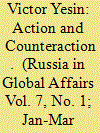

|
|
|
|
|
| Publication |
2009.
|
| Summary/Abstract |
Washington's plan to deploy a European segment of its missile defence system is a most sensitive issue and a major pet peeve of Russia - U.S. relations. Many observers agree that the ability of the sides to find a compromise solution to this problem would be indicative of the prospects for bilateral ties in the years to come.
PASSIONS OVER THE THIRD POSITION AREA
The planned third position area of a U.S. global missile defence system would include silos with interceptor missiles in Poland (the Ustka military range near the town of Slupsk in Pomeranian Voivodeship) and a missile defence radar in the Czech Republic (the Brdy military area near Jince, 60 km south-west of Prague). The first and second position areas of the ground-based echelon of the U.S. strategic missile defence system are deployed on the territory of the United States - in Fort Greely, Alaska and at Vandenberg Air Force Base, California, respectively.
The decision made by Washington in late 2005 to deploy a third position area near Russia's western border was taken by Moscow as a threat to its national security. (For more on this subject, see "Missile Defence Challenges" by Pavel Zolotarev in Russia in Global Affairs, N 3, July-September 2008.) To allay Moscow's fears, the George W. Bush administration made several attempts between 2006 and 2008 to convince the Russian leadership that the third position area was not directed against Russia.
|
|
|
|
|
|
|
|
|
|
|
|
|
|
|
|
| 2 |
ID:
087878
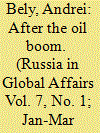

|
|
|
|
|
| Publication |
2009.
|
| Summary/Abstract |
Record-high oil prices in the recent years brought an illusion with Russian oil and gas companies that their easy profits would continue forever. The financial crisis and the subsequent recession have taught them a harsh but useful lesson: even enormous hydrocarbon resources are not enough for prosperity.
Five Russian majors (Rosneft, LUKoil, TNK-BP, Surgutneftegaz and Gazprom-Oil) have more energy resources than the leading Western companies, while Gazprom is the world's leader in natural gas resources. However, the Russian corporations are behind their major rivals in terms of capitalization and stable position on the market. Owing to their diversified investment structure, international oil and gas companies influence the formation of the norms that provide stability both inside and beyond individual countries. Even their occasional performance setbacks in underdeveloped countries do not undermine their reputation as successful global players. Stability in the market helps them counteract the volatility of oil prices.
When oil prices were high, Russian companies could easily attract financial capital. Short-term profits earned them stable credit ratings and encouraged them to take long-term loans for large investments. However, the liquidity crisis froze many long-term investment projects
|
|
|
|
|
|
|
|
|
|
|
|
|
|
|
|
| 3 |
ID:
087873


|
|
|
|
|
| Publication |
2009.
|
| Summary/Abstract |
In a little-noticed coincidence, President Dmitry Medvedev and the then Democratic Presidential Nominee Sen. Barack Obama delivered major foreign policy speeches in the summer of 2008 in Berlin. Notwithstanding important differences, both recognized the flaws of the prevailing international system and emphasized the need for a new global order that transcends narrow national self-interest and addresses common security threats. Crucially, President Medvedev and Sen. Obama each vowed to strengthen U.S. - Russian ties and to build broader alliances.
A few weeks later, the events in the Caucasus and the financial meltdown changed international relations and East-West ties fundamentally and irreversibly. The Georgian conflict not only exacerbated NATO's profound internal divisions but also underscored the West's lack of strategic vision and purpose.
In the foreseeable future America will remain the world's sole military superpower, but - especially since the disaster of Iraq, Guantanamo and Abu Ghraib - the U.S.A. (and her allies) have lost credibility and the moral authority to claim global leadership. Support for Mikheil Saakashvili's reckless aggression and his corrupt regime revealed once more Western double standards and the Atlanticist disregard for genuine democracy and justice
|
|
|
|
|
|
|
|
|
|
|
|
|
|
|
|
| 4 |
ID:
087864
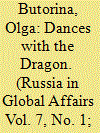

|
|
|
|
|
| Publication |
2009.
|
| Summary/Abstract |
The current crisis is often seen as a match to the Great Depression of the 1930s. Yet there is a hope that it would not evolve into a humanitarian disaster. The standard of living in the crisis-hit countries is much higher now than 80 years ago, and they are not facing the threat of all-out unemployment or poverty. The world's GDP is not going to fall by one quarter within the next few years, and hungry people will not be marching to Washington or other capitals, while inhuman dance marathons, such as the one in Sydney Pollack's movie is likely to forever remain a screenplay.
The two crises are similar in that they both began in the United States, with financial upheavals quickly engulfing the manufacturing sector and a majority of regions of the world. The key common characteristic is the breakdown of market mechanisms. In the 1930s, it was caused by the first wave of globalization. Production technologies changed dramatically at the turn of the 20th century: there was a breakthrough in the development of transport and communications, and transnational oil companies were established and gained a firm footing. As a result, certain national and colonial economies were drawn into the world economic system. The collapse of the New York Stock Exchange on October 24, 1929 put an end to an erratic market. It turned out that market forces could not run the world economy without an active participation by the state.
|
|
|
|
|
|
|
|
|
|
|
|
|
|
|
|
| 5 |
ID:
087867
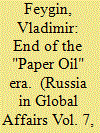

|
|
|
|
|
| Publication |
2009.
|
| Summary/Abstract |
The world community has entered a period that will determine the future development of the economy and, possibly, the entire arrangement of the global system. Manifestations of the crisis are wide-reaching and multifaceted, while the unstable situation makes forecasting barely possible. Dynamical systems theory experts link such phenomena to the "points of bifurcation," at which the smooth trajectory of development ends and the system's behaviour undergoes a restructuring, the results of which are hard to predict.
Some weighty disproportions, underestimated interconnections and risks that were not embraced by an in-depth analysis or were simply hushed up have come to the surface. The crisis makes it easier to rethink the situation, as the dominant paradigm, which could scarcely be called into question in conditions of economic growth, is getting weaker.
The structure of economic ties that took shape in the past decades has serious inherent inconsistencies. The widespread conviction that the expanding global economy is stable by virtue of its scale and diversification of the participants' interests is creaking at the seams. The towering imbalances of world trade and U.S. deficits aggravate the general situation, but market participants cannot assess the situation adequately or counteract to it using the available instruments (hence the abrupt fluctuations of exchange rates). As a result, market participants often act relying on feelings (sometimes strange even for professional market analysts) that easily grow into panic.
|
|
|
|
|
|
|
|
|
|
|
|
|
|
|
|
| 6 |
ID:
087872
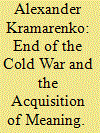

|
|
|
|
|
| Publication |
2009.
|
| Summary/Abstract |
The end of the Cold War caught many people by surprise on both sides of the infamous Iron Curtain. It bred a euphoria that was not a substitute for sober analysis, which simply seemed to be uncalled for at the time. The awareness came much later that the world had entered an unprecedented transitional period in its development that would obviously result in an intellectual challenge. These moods were summarized in a call to formulate a shared vision of the new historical era. The crisis of U.S. foreign policy, boldly manifested in "war of choice" in Iraq, sent a signal of alarm. It seemed that a country that had emerged victorious from the Cold War should not undergo this crisis. Yet we are now seeing a global financial and economic crisis rooted in the ideologies and practices of how the U.S. financial sector functioned over the past two decades. It shows convincingly that one-sided solutions and actions cannot bring any of the so-called public goods to the international community. On the contrary, solutions are not being found to existing problems and new ones are springing up.
Presumably, the riddle of the current stage of global development cannot be solved unless one gleans the meaning of what happened at the end of the 1980s and the beginning of the 1990s. It would not be an overstatement to claim in this connection that the problem of what the future has in store for the U.S. - which has become the facade of the historical West - will be of key significance.
|
|
|
|
|
|
|
|
|
|
|
|
|
|
|
|
| 7 |
ID:
087868
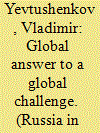

|
|
|
|
|
| Publication |
2009.
|
| Summary/Abstract |
It is difficult to agree emotionally with the analysts and publicists who point out positive aspects of the on-going global economic crisis, yet there is undoubtedly one positive factor in it. The crisis has not only caused people to mobilize material and intellectual resources, but has forced one to consider how the economy may change in general and what has to be adjusted to secure its further development.
It is quite possible that anti-crisis measures, as hostages of inertia thinking, are far off the mark, and other solutions will be needed based on another paradigm for analyzing the economic matter. Regardless of speculations about the causes of the crisis, we all understand that the post-crisis economy will be different. What kind of economy will it be?
The very real possibility of a dangerous divergence between reality and expectations requires active efforts to develop the future economic model not only on the part of academic scientists, but also by those who are deeply involved in the economy and influence the functioning of the economy to a certain extent, i.e. business people. It is due to this involvement that the impact of the crisis becomes much more painful, while the need for its positive comprehension is felt more acutely.
|
|
|
|
|
|
|
|
|
|
|
|
|
|
|
|
| 8 |
ID:
087863
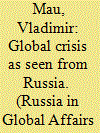

|
|
|
|
|
| Publication |
2009.
|
| Summary/Abstract |
The global economic crisis is rapidly growing and it is difficult to say yet how long it will last. Forecasting the future of this crisis is as senseless as forecasting crude oil prices. When they were high, the only thing one could say confidently was that prices would eventually fall some day. In much the same way, one can be sure now that the crisis will end one day, although neither when that will happen, nor the amount of damage, nor the layout of the post-crisis economy are known yet.
The crisis Russia went through in 1998 had domestic roots - a weak government incapable of conducting a responsible macroeconomic (budgetary, in the first place) policy. The current situation is markedly different: for the first time ever, this country is coming to grips with a world crisis as part of the global economic and financial system. This signifies that Russia is gradually turning into a normal market economy.
|
|
|
|
|
|
|
|
|
|
|
|
|
|
|
|
| 9 |
ID:
087880


|
|
|
|
|
| Publication |
2009.
|
| Summary/Abstract |
The 2008 developments concerning Kosovo, Abkhazia and South Ossetia have once again demonstrated the obvious conflict between the principles of the right of nations to self-determination and the territorial integrity of states. They have also shown how difficult it is to address the challenges of separatism. The interest in the phenomenon of nationalism has again increased in the world. Experts and politicians are trying to define various types of nationalism and to understand the difference between ethnic nationalism and civic nationalism, and what potential the latter type of nationalism has. Obviously, ethnic nationalism is not gone. But if its manifestations are inevitable, is it possible to have it acquire liberal, non-violent forms?
|
|
|
|
|
|
|
|
|
|
|
|
|
|
|
|
| 10 |
ID:
087876


|
|
|
|
|
| Publication |
2009.
|
| Summary/Abstract |
The present bilateral cooperation between Russia and the European Union rests on an extended Partnership and Cooperation Agreement of June 24, 1994, concluded between the European Communities and their member states, on the one part, and the Russian Federation, on the other part. This Agreement is usually described as bilateral - between Russia and the EU. But strictly speaking, the Agreement is multilateral as one party that signed it was Russia and the other included the then 15 member states of the European Community, the European Coal and Steel Community, and the European Atomic Energy Community, plus these three organizations per se - that is, 18 international legal entities. Considering the changes in the EU that have taken place since then, the 'Community' as the other party to the Agreement is now represented by 29 international legal entities. According to Article 104 of the Agreement, "the term 'Parties' shall mean the Community, or its Member States, or the Community and its Member States."
|
|
|
|
|
|
|
|
|
|
|
|
|
|
|
|
| 11 |
ID:
087879


|
|
|
|
|
| Publication |
2009.
|
| Summary/Abstract |
Russian support for Abkhazia and South Ossetia, which came about as a result of a number of circumstances, may play the role of a catalyst for Russia's modernization, but the two territories are very different and require different approaches.
A spontaneous development is likely to turn Abkhazia into a Russian health spa and military appendage, and this is unacceptable because it is fraught with complicating relations and losing existing opportunities. Rather than focusing on using Abkhazia as a potential health resort, Russia should build the missing financial and technological elements of its own economy there. By creating instruments of modernization outside its territory - where they would be protected from Russian kleptocracy and monopolies - Russia could see a dress rehearsal of its own modernization.
South Ossetia does not exist as an economic entity due to its small size and extremely low-level management. Russia must bring rudimentary order to South Ossetia's finances and thus lay the groundwork for the reunification of the Ossetian people within the Russian Federation.
|
|
|
|
|
|
|
|
|
|
|
|
|
|
|
|
|
|
|
|
|